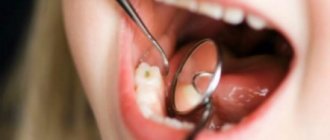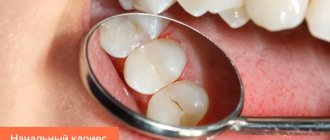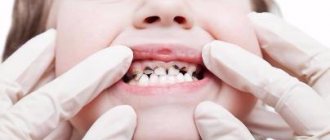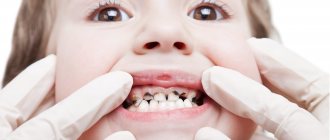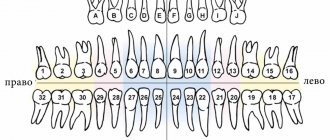Dr. Niklas Bartling (Dr. Niklas Bartling) doctor, private practice, Altstatten (Switzerland)
Flowable Bulk-Fill composites are intended for restoration of the dentin layer of class I and II restorations. The article presents a treatment concept that features optimal restoration technology, high efficiency and good esthetics, making it also ideal for pediatric dentistry.
Filling chewing primary teeth damaged by caries with composites - in comparison with other materials - has long been considered very expensive. With the development of Bulk-Fill technology, the situation has changed dramatically. The labor-intensive layer-by-layer filling of the cavity with filling material has in most cases been reduced to the formation of the entire filling with just one layer. The newly developed Tetric® EvoFlow Bulk Fill composite is designed for exactly this purpose. In combination with other components from lvoclar Vivadent, it allows effective treatment of young patients.
Indications and contraindications
Many parents do not want to put fillings on their children's baby teeth. They consider dental treatment to be unnecessary stress for the child, for which they also have to pay. In the understanding of adults, temporary teeth are not particularly valuable, because they will fall out anyway. In fact, the role of temporary occlusion in a child’s life is very great. Baby teeth are needed for:
- complete chewing of food;
- proper development of the jaws;
- formation of a healthy bite;
- preparing the oral cavity for the appearance of permanent units;
- developing clear diction.
Untimely treatment of caries is fraught with chronic pathologies of the digestive tract and ENT organs. Premature loss of temporary units leads to malocclusion and deformation of the dentition. Indications for filling are:
- unit destruction up to 50%;
- deep caries;
- a large reserve of time before the root unit erupts;
- enamel chips;
- the need to restore the anatomy of the crown after treatment of pulpitis or periodontitis.
Temporary units that are subject to deletion are:
- mobile;
- destroyed by more than 50%;
- will soon be replaced by permanent ones (determined by the length of the roots according to X-ray examination);
- collapsed despite previous filling.
Would you like us to call you back?
Reviews
Taking your child to the dentist’s office is an important undertaking, because in childhood a lifelong attitude towards one’s own health is formed. Therefore, we make every effort to ensure that young patients and their parents have only positive emotions after dental treatment. You can judge this by reading the reviews about the Natadent clinic left by our clients.
We will be grateful if you also leave a review describing your impressions of the visit. This will be an excellent hint for us about which aspects of our work are especially important for young patients and their parents. We strive to be the best and are happy to improve with your help!
Features of filling
For filling temporary units, light-curing composites, as well as colored glass ionomer mixtures, are used. These are highly durable materials that are completely safe for children.
If the unit is at one of the stages of treatment, a temporary filling is placed. Its service life does not exceed 10 days. Once the doctor is convinced that there is no inflammation, a permanent filling will be installed. When treating pulpitis in children, the crown is restored after filling the canals.
The difference between filling baby teeth and molars is the method of applying the filling material. To prevent the re-development of caries on the treated unit, the doctor hermetically closes the carious cavity and remaining fissures.
What aspects should be considered when choosing a filling material?
Composites, like compomers, are successfully used in clinical practice for the treatment of primary teeth. In a 2006 clinical study, Tetric Flow was shown to achieve good results in class 11 cavities in primary molars. Baby teeth are less resistant to abrasion than permanent teeth. Therefore, the reduced resistance to abrasive wear, characteristic of flowable composites, is not significant.
Tetric EvoFlow Bulk Fill is a flowable composite. This material can be applied in a layer up to 4 mm thick, and when filling baby teeth it does not require the application of an outer covering layer. That is, most defects in primary teeth can be filled in one working step. This is made possible by the new photosensitive initiator lvocerin®. Studies show that even in difficult conditions - for example, the location of the polymerization lamp at an angle - it ensures full light polymerization of the filling material; Integrated reliability guarantee is very important for pediatric dentistry. Under the light of an operating lamp on a work chair, the composite does not harden too quickly, which makes working with the material easier. Thanks to the chemical "Licht-Controllers" the dentist gets more than four minutes of working time without having to reduce the brightness (8000 lux) of the light. Unlike most flowable Bulk-Fill materials, after polymerization Tetric EvoFlow Bulk Fill exhibits a translucency close to natural dentin and optimally adapts to the color of primary teeth. Of the three available colors, 1vw is the best for pediatric dentistry.
What is a light seal
Modern dentistry uses light fillings to restore teeth in children. The material has a liquid texture, is well distributed inside the prepared cavity, and penetrates into any recesses (even the most difficult to reach). It hardens under the influence of light rays of a certain length and is firmly attached to the preserved tissue. Contrary to popular belief, modern light fillings are very durable and last a long time. The restoration process takes a minimum of time, which is especially convenient in pediatric dentistry. It is possible to seal several units at once.
Dental treatment under anesthesia
General anesthesia is an effective way to make the treatment process as comfortable as possible. The child simply falls asleep and wakes up with healthy teeth. Thanks to this, the next time he will not feel afraid before visiting the dental office.
Dental filling for children under anesthesia is preferable in the following situations:
- treatment will last more than an hour;
- it is assumed that the procedure will be painful (when treating distant teeth or advanced caries);
- you need to fill several teeth at a time;
- local anesthesia is not possible (for example, due to allergies);
- it is not possible to place a filling on the child, since any actions in the oral cavity cause a gag reflex;
- unable to overcome panic fear of treatment.
The Natadent dental clinic employs qualified anesthesiologists who will calculate the dose of the drug with maximum accuracy. Thanks to this, the child will wake up immediately after the procedure, and drowsiness will pass very quickly. Modern drugs are completely safe and are used in the treatment of children over 3 years old, so any worries about the consequences are unnecessary.
Stages of filling
Diagnostics
The doctor conducts an examination and X-ray examination (sight or panoramic image) to assess the depth of enamel destruction. If inflammation spreads to surrounding tissues, treatment with the installation of a temporary filling will be required.
Preparation
The dentist cleans the teeth from soft deposits. Using a medical retractor and rubber dam, isolates the unit from saliva. Gives anesthesia. When working with children, the site of injection of the anesthetic is first numbed (a spray is sprayed or a gel is applied). Next, the doctor cleans the carious cavity (manually, chemically or using a drill) and removes all affected tissue of the dentinal layer. If necessary, remove the pulp and apply medicine for several days. Then he cleans the channels.
Sealing
The doctor checks the quality of canal filling. Then he places the filling material into the cleaned cavity, distributes it evenly and carefully seals the fissures. To make the material hard, a beam of light from a special lamp is directed at it. Removes excess composite and polishes the surface of the unit.
Diseases that can be treated with dental fillings
Tooth decay is a major problem that can be solved with dental fillings. However, caries is a slow and irreversible process that affects the tooth enamel, cavity and bone of the tooth.
The main reasons for its development are:
- cariogenic bacteria that take part in the formation of dental plaque. It is dental plaque that contributes to the rapid development of caries, since it contains a number of acids that are dangerous to tooth enamel, such as lactic, formic, propionic and butyric.
- fermentable carbohydrates (fermentation of carbohydrates is carried out with the help of bacteria that fill the oral cavity, as a result of which the same dental plaque is formed, containing acids that change the pH balance and contribute to the destruction of enamel).
Primary caries is characterized by the formation of a chalk spot, which subsequently transforms into a carious cavity. In general, this disease is treatable at any stage. At the same time, the only effective method of treating caries of any severity is dental filling.
However, when entrusting yourself to the hands of a dentist, it is worth remembering that a poor-quality filling or unscrupulous filling of a carious cavity often becomes the cause of further development of caries, which can be accompanied by complications. The most painful of them are pulpitis and periodontitis.
The specialists of the Nutcracker family dental clinic are doctors of the highest category and have many years of experience in dental treatment. In addition, when you contact us for dental fillings, you receive a one-year guarantee on each filling!
Result
Placing a filling on a baby tooth allows you to isolate living tissue from external influences and eliminate pain. With the help of fillings, the development of caries and its complications is stopped. On the surface of the filling, the doctor models the relief of the unit, which ensures complete occlusion (closing) of the jaws, restoration of chewing function, and uniform distribution of the load. The units restored by filling are replaced by permanent ones in a natural way, which is optimal for the development of diction and the formation of a healthy bite.
How long will the filling last?
The service life of such a filling largely depends on the quality of the work performed, regular oral care and compliance with the dentist’s recommendations, which boil down to the following:
- Regular brushing of teeth using dental floss and mouthwash throughout the day;
- Reducing consumption of fast carbohydrates (flour products, sugary drinks and food);
- Including more plant foods with a high content of solid fiber in the diet;
- Visit the dentist regularly – once every six months – for preventive examinations.
The practice of specialists at the NovoDent clinic shows that such a filling can last at least 3 to 5 years.
If the patient strictly follows the recommendations of the attending physician, the service life of the filling increases significantly - at least 2 times.
Advantages of SM-Dentistry
- Qualified pediatric dentists The best dentists in Moscow work here, having extensive experience in treating children. Knowing the basics of child psychology, doctors establish trusting relationships with the little patient and carry out all therapeutic and diagnostic manipulations in a playful manner. This avoids fear and stress in the child. Our dentists explain in an accessible manner the importance of treatment and teach the child how to properly perform hygiene procedures.
- Comprehensive services We monitor the oral health of our patients from the moment the first tooth appears. Regular preventive examinations make it possible to identify diseases in the early stages, when treatment can be carried out quickly and painlessly. We perform dental fillings under local anesthesia (application + injection), under sedation (if the child is anxious) or under anesthesia (if several teeth need to be treated at once). Thanks to qualified anesthesia, these procedures are absolutely safe for children.
- The best materials Doctors use advanced equipment and certified materials from world-famous manufacturers in their work. We use only those medications that are registered in our country and are absolutely safe for the youngest patients.
You can find out more details and sign up for a consultation with a specialist by calling: +7
, or by filling out the form:
Filling for a child - high quality, pain-free and at an affordable price
Most parents are reluctant to visit the dental office with their children. They perceive this as stress for the child, since they clearly remember their own childhood. In their memories, the dentist is a doctor with a stern look, cold hands and an arsenal of instruments for torture. Fortunately, pediatric dentistry looks very different today.
At the Natadent dental clinic, dental fillings for children are performed by qualified doctors, whose professionalism is manifested not only in high-quality treatment, but also in the ability to find an approach to young patients.
The following features of our clinic help us make treatment comfortable for the child:
A children's playroom where the doctor gets to know each other and spends time in a playful way with the baby before the appointment.
- friendly atmosphere in the office, preliminary communication and explanation of all the intricacies of treatment.
- use of modern tools and materials;
- local anesthesia, sedation and general anesthesia (if necessary);
- colored fillings and other playful ways to motivate a child;
- gifts after each reception
- cartoons during treatment
If you want your child to have healthy teeth and not be afraid of the dental office in the future, bring him to the Natadent clinic. Our doctors perform dental fillings for children quickly, efficiently and in a fun way. Thanks to this, the child will not be afraid and will remember that dental treatment is a short, painless and very important procedure.
